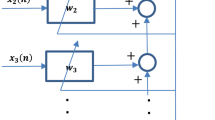Abstract
This paper presents practical implementation of the equiconvergent learning algorithm for blind source separation. The equiconvergent algorithm [4] has favorite properties such as isotropic convergence and universal convergence, but it requires to estimate unknown activation functions and certain unknown statistics of source signals. The estimation of such activation functions and statistics becomes critical in realizing the equi-convergent algorithm. It is the purpose of this paper to develop a new approach to estimate the activation functions adaptively for blind source separation. We propose the exponential type family as a model for probability density functions. A method of constructing an exponential family from the activation (score) functions is proposed. Then, a learning rule based on the maximum likelihood is derived to update the parameters in the exponential family. The learning rule is compatible with minimization of mutual information for training demixing models. Finally, computer simulations are given to demonstrate the effectiveness and validity of the proposed approach.
Access this chapter
Tax calculation will be finalised at checkout
Purchases are for personal use only
Preview
Unable to display preview. Download preview PDF.
Similar content being viewed by others
References
S. Amari. Differential-geometrical methods in statistics, Lecture Notes in Statistics, volume 28. Springer, Berlin, 1985.
S. Amari. Natural gradient works efficiently in learning. Neural Computation, 10:251–276, 1998.
S. Amari and J.-F. Cardoso. Blind source separation-semiparametric statistical approach. IEEE Trans. Signal Processing, 45:2692–2700, Nov. 1997.
S. Amari, T. Chen, and A. Cichocki. Stability analysis of adaptive blind source separation. Neural Networks, 10:1345–1351, 1997.
S. Amari, A. Cichocki, and H.H. Yang. A new learning algorithm for blind signal separation. In G. Tesauro, D.S. Touretzky, and T.K. Leen, editors, Advances in Neural Information Processing Systems 8 (NIPS*95), pages 757–763, 1996.
S. Amari and M. Kawanabe. Information geometry of estimating functions in semiparametric statistical models. Bernoulli, 3(1):29–54, 1997.
S. Amari and H. Nagaoka. Methods of Information Geometry. AMS and Oxford University Press, 2000.
H. Attias. Indepedent factor analysis. Neural Computatation, 11(4):803–851, 1999.
A.J. Bell and T.J. Sejnowski. An information maximization approach to blind separation and blind deconvolution. Neural Computation, 7:1129–1159, 1995.
J.-F. Cardoso and B. Laheld. Equivariant adaptive source separation. IEEE Trans. Signal Processing, SP-43:3017–3029, Dec 1996.
A. Cichocki and R. Unbehauen. Robust neural networks with on-line learning for blind identification and blind separation of sources. IEEE Trans Circuits and Systems I: Fundamentals Theory and Applications, 43(11):894–906, 1996.
P. Comon. Independent component analysis: a new concept? Signal Processing, 36:287–314, 1994.
S. Douglas, A. Cichocki, and S. Amari. Multichannel blind separation and deconvolution of sources with arbitrary distributions. In Proc. of NNSP’97, pages 436–445, Florida, US, September 1997.
C. Jutten and J. Herault. Blind separation of sources, Part I: An adaptive algorithm based on neuromimetic architecture. Signal Processing, 24:1–10, 1991.
T. Lee and M. Lewicki. The generalized gaussian mixture model using ica. In P. Pajunen and J. Karhunen, editors, Proc. ICA’2000, pages 239–244, Helsinki, Finland, June 2000.
E. Oja and J. Karhunen. Signal separation by nonlinear hebbian learning. In M. Palaniswami, Y. Attikiouzel, R. Marks II, D. Fogel, and T. Fukuda, editors, Computational Intelligence-A Dynamic System Perspective, pages 83–97, New York, NY, 1995. IEEE Press.
W. Lee T, M. Girolami, and T. Sejnowski. Independent component analysis using an extended infomax algorithm for mixed sub-gaussian and super-gaussian sources. Neural Computation, 11(2):606–633, 1999.
L. Zhang, A. Cichocki, and S. Amari. Natural gradient algorithm for blind separaiton of overdetermined mixture with additive noise. IEEE Signal Processing Letters, 6(11):293–295, 1999.
Author information
Authors and Affiliations
Editor information
Editors and Affiliations
Rights and permissions
Copyright information
© 2001 Springer-Verlag Berlin Heidelberg
About this paper
Cite this paper
Zhang, L.Q., Amari, S., Cichocki, A. (2001). Equi-convergence Algorithm for Blind Separation of Sources with Arbitrary Distributions. In: Mira, J., Prieto, A. (eds) Bio-Inspired Applications of Connectionism. IWANN 2001. Lecture Notes in Computer Science, vol 2085. Springer, Berlin, Heidelberg. https://doi.org/10.1007/3-540-45723-2_100
Download citation
DOI: https://doi.org/10.1007/3-540-45723-2_100
Published:
Publisher Name: Springer, Berlin, Heidelberg
Print ISBN: 978-3-540-42237-2
Online ISBN: 978-3-540-45723-7
eBook Packages: Springer Book Archive




